Climate change is one of the most urgent issues facing mankind. Observations confirm the planet is warming at an unprecedented rate and impacts of this warming will be felt from individuals to nations, as industries, communities and governments adjust to a changing future. To ensure sustainability and to meet the needs of future generations, the rate of adaptation must exceed the rate of change.
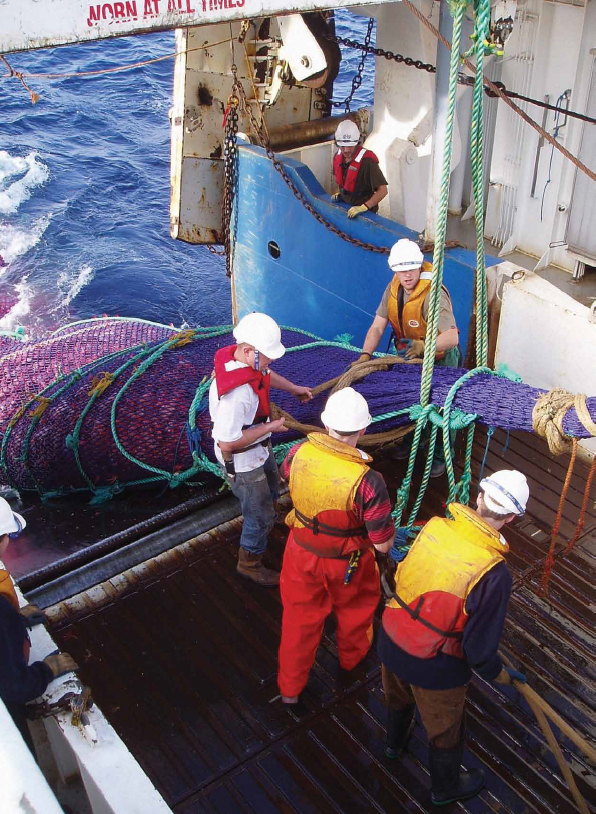 This programme brings together projects that are built around a range of initiatives that help individuals, communities, managers and industries to understand the impacts of a changing climate in a context
that assists them to understand the implication of a changing climate and to consider their needs to adapt to a changing marine world.
This programme brings together projects that are built around a range of initiatives that help individuals, communities, managers and industries to understand the impacts of a changing climate in a context
that assists them to understand the implication of a changing climate and to consider their needs to adapt to a changing marine world.
Seven main research projects have been undertaken to date. The research undertaken for this series of projects includes key collaborations with CSIRO and other schools within the University of Tasmania and has generated a range of publications.
A large number of researchers from IMAS, the University of Tasmania and collaborating organisations have worked on the projects listed here. To read more about each project scroll down or click on the links below:
The world's oceans are important sources of protein and livelihoods for coastal communities. From food security and poverty, to regional and national balance sheets, fishing activity affects countries in a range of ways.
The oceans are not warming evenly and those areas that are warming the fastest will become the world's natural laboratories to provide the knowledge and tools to enable us to adapt wisely, efficiently and effectively to meet the challenges of a warming environment.
Water temperature is only one variable responding to climate change but it is the major driver of distribution, abundance, phenology and life history of marine organisms. Based on historical (last 50 years) and projected (next 50 years) rates of ocean warming, 24 regional hotspots – areas that are warming faster than 90% of the oceans – have been identified (see image above). These hotspots occur in all regions of the globe, from polar to tropical, and affect developed and developing countries.
For more information read the Global hotspots information flyer or visit the webpage.
Sub-project 1.1 Preparing for climate change on marine systems in Australia and India
Australia and India have coastal marine waters warming at a rate faster than 90% of the world's oceans. Both countries have extensive coastlines and marine jurisdictions with the majority of the population living adjacent to the coast. Marine industries play important roles in sustaining the livelihoods of people in coastal rural towns. Increasing food production, minimising carbon emissions and prioritising carbon sequestration opportunities are key issues facing both countries and form the basis of this research plan.
For more information read the Aust-India Climate Change Plan or the Executive Summary.
Sub-project 1.2 Global learning for local solutions: Reducing vulnerability of marine-dependent coastal communities (GULLS)
Many coastal communities rely on marine resources for livelihoods and food security. As populations increase, demands for marine resources place increasing pressure on coastal resources already under stress from pollution, coastal development, and habitat degradation. Climate change and variability (including changing frequency of extreme events) also impact coastal systems and the vulnerability of dependent communities. Fast warming marine regions represent natural laboratories for observing change and developing adaptation options and management strategies. To ensure sustainable industries, ecosystems, livelihoods and communities, a trans-disciplinary whole of system approach is required. Linking and comparing across rapidly warming regions provides unique opportunities to extend existing collaborative efforts and connect local adaptation research and outcomes to improve global learning. In focusing on adaptation options and strategies for enhancing coastal resilience at the local level, this project will contribute to capacity building and local empowerment. This project works across 5 hotspot regions in the southern hemisphere: Southwestern South Africa, Mozambique Channel, Southern India, South-Eastern Australia and Eastern Brazil.
For more information visit the GULLS Project website.
Sub-project 1.3 GLORIA (Global Learning Opportunities for Regional Indian Ocean Adaptation)
The oceans are not warming evenly. In some fast
warming areas the challenges will be felt earlier and more acutely. One such
'hotspot' covers the seas south and west of Madagascar. There are no simple
solutions for adapting to climate change. Finding appropriate options requires
scientific understanding on a global scale, regional expertise, detailed
information about the hotspot area, and local understanding of social and
environmental contexts.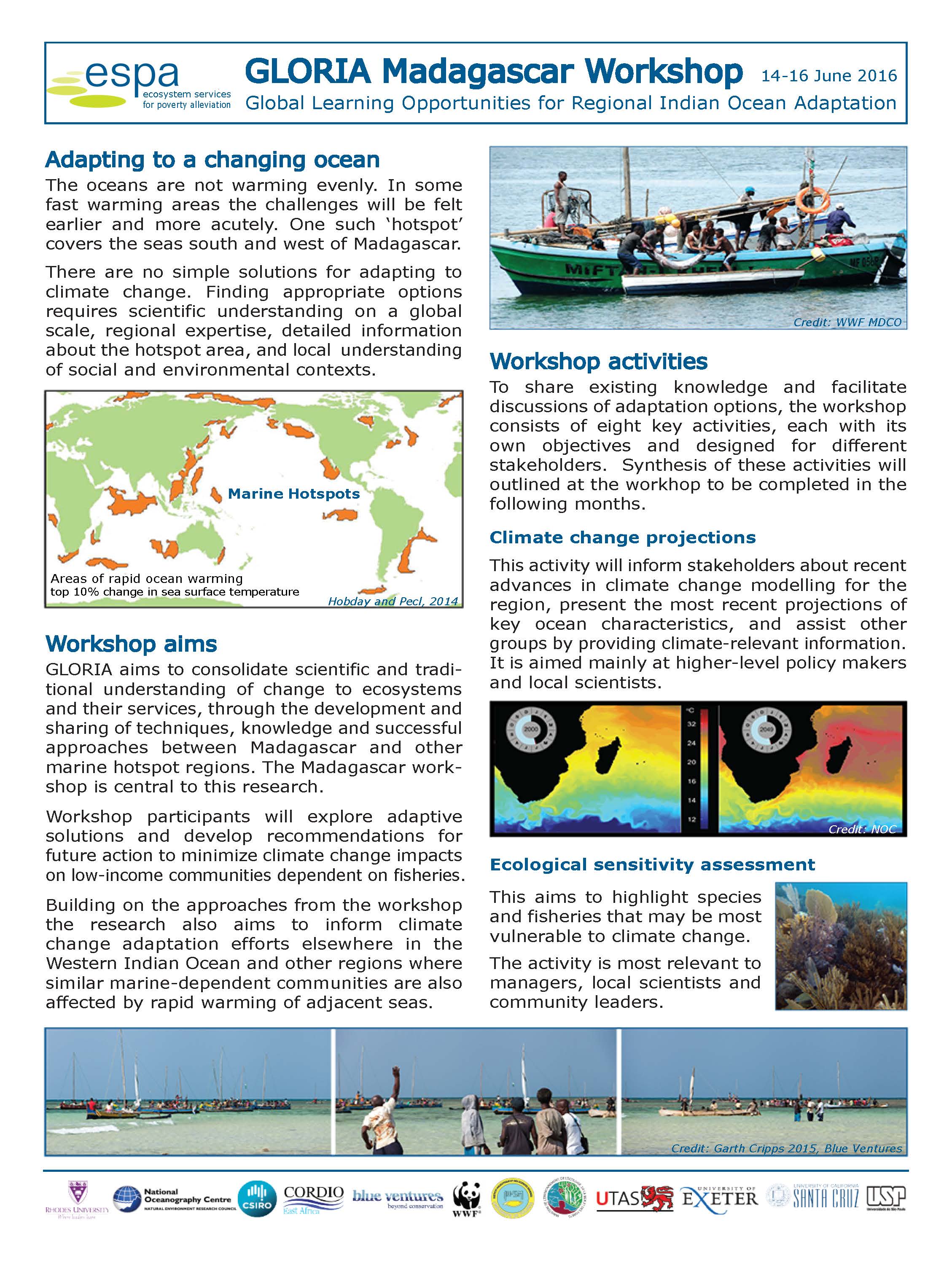
GLORIA aims to consolidate scientific and traditional understanding of change to ecosystems and their services, through the development and sharing of techniques, knowledge and successful approaches between Madagascar and other marine hotspot regions. An intensive workshop in Madagascar is central to this research. Workshop participants will explore adaptive solutions and develop recommendations for future action to minimize climate change impacts on low-income communities dependent on fisheries. Building on the approaches from the workshop the research also aims to inform climate change adaptation efforts elsewhere in the Western Indian Ocean and other regions where similar marine-dependent communities are also affected by rapid warming of adjacent seas.
For more information read the GLORIA information flyer.
The South-Eastern region of Australia has experienced significant oceanographic changes over recent decades and this has been reflected by changes in the associated ecosystems: range extensions have been documented in several dozen species, major distributional shifts have been recorded in barrens-forming sea urchins, bivalves and gastropods, and major declines in rock lobster recruitment have also been related to ocean warming and changing circulation patterns.
The major goal of this project was to undertake a screening-level risk assessment of the potential impacts of climate change on key fishery species in the south east Australian region. Thorough literature reviews and species assessment profiles were completed for key species to underpin the ecological risk analyses. Physical drivers of climate change stressors on each fishery species were identified. Wild capture fishery and aquaculture species were ranked according to their need for further assessment of their vulnerability to climate change.
For more information read the reports:
Meeting the
challenge of preparing and adapting for climate change is arguably the most
important task confronting the management of our national marine resources.
Climate change is expected to result in significant impacts for marine
ecosystems with flow on social and economic implications for resource users and
communities. Importantly, regional coastal communities have high dependency on
marine industries that provide social and economic benefits through fishing,
aquaculture and tourism (e.g. recreational fishing and diving).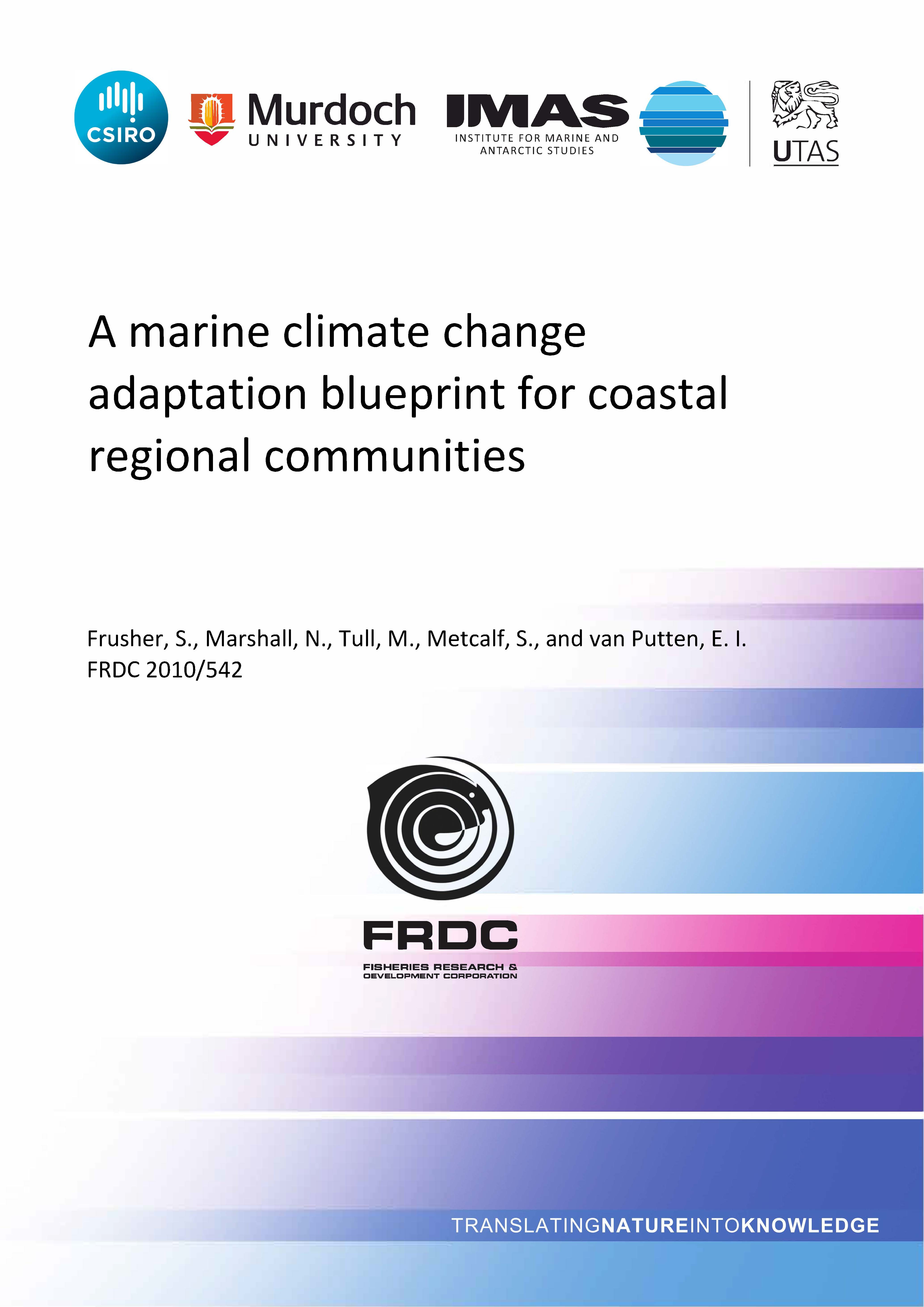
An innovative methodological approach to developing adaptation options was tested in three Australian case study communities in Tasmania, Queensland, and Western Australia. Qualitative models were used to determine the effect of current marine climate and non-climate pressures on the regional coastal community's marine sectors. Recognising the combined role of climate and non-climate change pressures in shaping marine sectors in small coastal communities is important to allow a holistic overview to be developed and thus avoid potential unintended adaptation consequences.
Read the bluepint here.
The overall
premise to this project is that adaptation by Australian fisheries and
aquaculture sectors to climate change will be enhanced by increased
awareness of markets and opportunities along the supply chain. The
specific project outcomes were:
To date, current perceptions regarding the options for fisheries along the supply chain were determined, and used to guide development of adaptation options, based on the social perception studies (status quo interviews). Inefficiencies and potential points for enhancing profitability including targeted recommendations in relation to efficiencies and reduction of the carbon footprint were identified using LCA. Strengths and weaknesses in the chain were identified using critical element analysis and, together with the LCA, informed the development of adaptation options.
Click to read the Final Report.
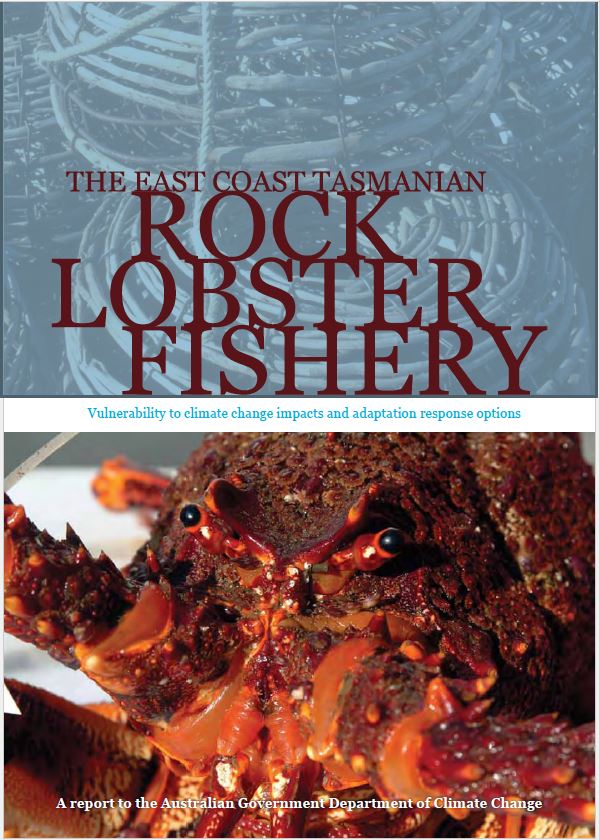
The study found that the rock lobster fishery is reasonably well placed to adapt to the challenges of climate change but identified several possible measures that will assist with this adaptation including improved catch modelling, long-term monitoring, better risk assessment, and effective education and communication with the industry. Understanding the impacts of climate change on the Tasmanian rock lobster industry is important because this fishery is ideally placed to be an 'early warning signal' for Australian fisheries generally.
Changes
in the distribution and abundance of marine species are being reported around
the globe; however, much of the present focus has been on documenting these
biological responses. Less well recognised is that many of the changes will
affect the utilisation of marine resources with ramifications that range from
fishers' profitability and livelihoods to food security, poverty and social
cohesion.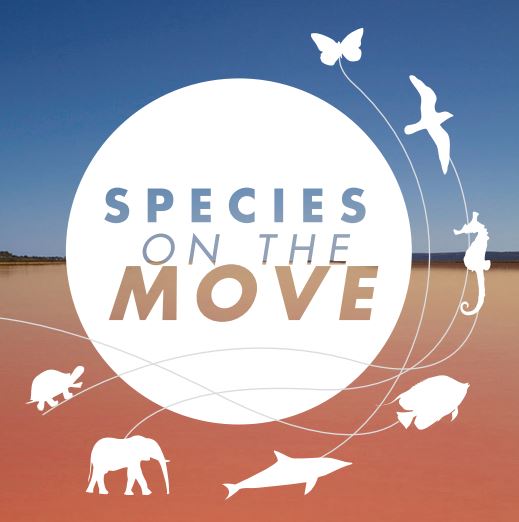
Regions where ocean warming is occurring most rapidly (marine hotspots) represent an opportunity to quickly advance our understanding of current and likely future changes. Synthesising available data on biological responses and subsequent human impacts (economic, social and governance) across marine hotspots will provide the basis for a comprehensive assessment of the dynamics and implications of range-shifting species. With two significant hotspots in Australia that are supported by existing IMOS data streams, Australia is well positioned to lead this inter-disciplinary study which will be of national relevance and global significance.
Videos of presentations and a Public Forum at the Species on the Move conference in Hobart in February 2016 can be viewed here.
Click here to find out more about the Conference.
Large-scale climate-driven shifts in species distribution
are being observed in every system and region of the globe and documenting and
responding to these changes, across vast scales, is a great challenge for
ecologists, natural resource managers and communities. In particular, countries
like Australia with around 60,000km of coastline and a very large marine
territory, face considerable challenges
when it comes to monitoring for biological changes in the marine environment. Yet
waters around Australia are warming at approximately 2-4 times the global
average, and many species are shifting where they live in response.
Redmap (Range Extension Database and Mapping project) invites recreational and commercial fishers, SCUBA divers, snorklers, boaters, beachcombers and others in the community to report marine species that are uncommon to a particular location – species 'new' to an area that may be shifting where they live in response to ocean warming. Redmap is essentially a framework for efficiently collecting, collating, verifying, sharing and using geo-referenced species observational data.
The project has two over-arching and equally weighted aims:
(1) Ecological monitoring to provide an early indication of potential range shifts; and
(2) Actively engaging the broader community on issues of marine climate change, largely using their own data.
For more information read the Redmap flyer, download the Redmap report card, or click here to visit the Redmap website.
Interested in this project?